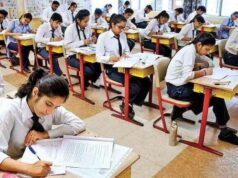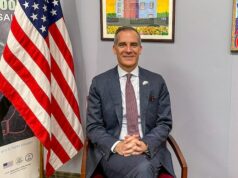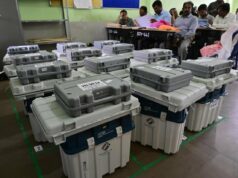Delhi’s abstention on Sri Lanka vote in Geneva is now playing out in Chennai

By Divya Chandrababu
In Mannar, the northern province of Sri Lanka, during the civil war, three children woke up on most mornings to dead bodies near their homes and schools. When they were outdoors, and between their school and home, a four-kilometre walk, their father taught them to run to the nearest shelter if they heard distant sounds of aerial bombs or shelling. The bombings took place so often that even the sound of a coconut breaking would send the children running in fear.
“…they [the children] were traumatised, so I decided to come to India,” said the father, who wished to remain anonymous because of the fear of reprisal for his family back home. His siblings and extended family stayed back in Sri Lanka.
For families like his, the 47-member United Nations Human Rights Council (UNHRC)’s resolution on Sri Lanka is an important step towards justice. On March 23, UNHRC adopted the resolution for promoting reconciliation, accountability, and human rights in Sri Lanka with 22 of its members voting in favour.
India abstained, generating concerns among the Sri Lankan Tamils in India. “Our tears and scars are still fresh… We are at peace now in India but how do we find closure for what happened to us if India takes a neutral position?” the 68-year-old father asked.
After living in a transitory camp for four years in Mandapam, his family was shifted to a refugee camp. His four sisters and three brothers stayed back. During the end of the war in 2009, his oldest brother and his children died when they were hiding in a trench. Colloquially called bunkers, these were the safest options to minimise injuries when there was shelling. But death was certain if a bomb landed inside the trench.
In Tamil Nadu, successive governments have provided education quota and other benefits for Sri Lankan Tamils. The three children, scarred by war during their childhood, now have a possibly secure future. One is studying for an MBA degree in a London university while two are employed in the state.
But to ensure justice for Sri Lankan Tamils, both domestic and international pressure is crucial, say activists. “There is value in the UNHRC process because there is an international spotlight on the issues, so we know there is fairness among the global community on this issue and it is not forgotten,” said Sri Lankan-born social worker Poongkothai Chandrahasan, who has been working with refugees for 17 years in Tamil Nadu.
It is voices like these from the ground and the sympathy and solidarity that they evoke among the wider population of the state that has generated pressure on political parties in Tamil Nadu.
India’s abstention has embarrassed the ruling All India Anna Dravida Munnetra Kazhagam (AIADMK). It is being held accountable as it in alliance with the Bharatiya Janata Party (BJP) in Tamil Nadu, which goes to polls on April 6.
Both AIADMK and Dravida Munnetra Kazhagam (DMK) have promised benefits for Sri Lankan refugees in their election manifesto such as dual citizenship and voting rights.
“We know the local parties support our rights and we are aware there may be no immediate solution,” said the father. His generation of refugees wants to return home. “It is our motherland after all,” he said. “But we will advocate for our right to vote and make it a reality before we return.”
While it is not a major electoral poll plank, the issue is sensitive in Tamil Nadu. Some regional parties such as S Seeman’s Tamil nationalist party Naam Tamizhar Katchi (NTK) and Vaiko’s Marumalarchi Dravida Munnetra Kazhagam (MDMK) have grown solely maintaining the Sri Lankan Tamils issue as their core ideology. Several Liberation Tigers of Tamil Eelam (LTTE) leaders, including its chief Vellupuli Prabhakaran, were associated with Dravidian leaders. When they came to the state, they often lived with Tamil families who supported their struggle.
Both AIADMK and BJP have said that India’s vote in Geneva would not affect their alliance, but the regional ally has come down heavily on its national partner. AIADMK leaders say that they are ideologically different from the BJP and the alliance is only aimed to defeat the DMK.
“This is not the first time that the BJP is making us answerable to criticism just before elections,” said an AIADMK leader, who wished to remain anonymous. “Before the Vellore by-poll, they passed the legislation against triple talaq and our candidate AC Shanmugam lost all the Muslim votes and the seat. On the Sri Lankan issue, however, our electoral prospects would not be impacted as the people who vote based on this issue will anyway choose NTK.”
MDMK is with the DMK and Vaiko, who was close to Prabhakaran. It has condemned the Central government for its stand on the vote.
DMK president MK Stalin said if there were no elections, the BJP would have voted in favour of Sri Lanka and called abstaining a “great betrayal.” Before the voting, Stalin and AIADMK’s ally, PMK, had urged the Centre to vote against Sri Lanka.
The BJP justified its stand, listing Prime Minister Narendra Modi-led government’s schemes and funds for Lankan Tamils. “Though we have abstained, we have issued a strong statement in favour of Sri Lankan Tamils,” said BJP leader CT Ravi. “This is not a political issue but a humanitarian issue between two countries.”
Modi had earlier said that the Centre would support the equality and dignity of Sri Lankan Tamils at a public meeting in Chennai in February.
“It is like lip-service,” reacted AIADMK’s senior leader C Ponnaiyan.
After the three-decade-long war ended in 2009, there have been seven resolutions on Sri Lanka in UNHRC. India’s position has varied. Ahead of the vote in March 2013, the DMK pulled out of the Congress-led United Progressive Alliance, which was in power at the Centre. DMK said the Congress did not do enough to address the alleged human rights violations of Tamils.
“The BJP is not bothered about the AIADMK’s position on the issue,” said political analyst Ravindran Duraisamy. “It is not an election issue though it would be spoken about during campaigning and only NTK may get voters on this issue.”



